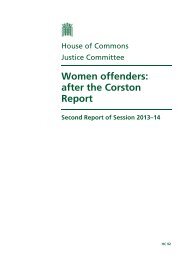Minority voices: Research into the access and acceptability of ... - MMC
Minority voices: Research into the access and acceptability of ... - MMC
Minority voices: Research into the access and acceptability of ... - MMC
- No tags were found...
Create successful ePaper yourself
Turn your PDF publications into a flip-book with our unique Google optimized e-Paper software.
Neville Street also <strong>of</strong>fers provision for <strong>the</strong> pre-schoolage group. There are three Stay <strong>and</strong> Play sessions <strong>and</strong>one Family Workshop a week for <strong>the</strong> under 4s <strong>and</strong><strong>the</strong>ir parents, with <strong>the</strong> aim <strong>of</strong> encouraging parents toplay with <strong>the</strong>ir children or to provide positive playingexperiences for <strong>the</strong>ir children. Both <strong>the</strong> Stay <strong>and</strong> Playsessions <strong>and</strong> <strong>the</strong> Family Workshops run in term-timeonly. During <strong>the</strong> holidays, Neville Street runs aplayscheme for 5 – 11 years olds, <strong>and</strong> <strong>of</strong>fers activitiesfor some <strong>of</strong> <strong>the</strong> siblings <strong>of</strong> <strong>the</strong> under 4’s.O<strong>the</strong>r resources <strong>of</strong>fered by Neville Street include atoy library <strong>and</strong> individual case work support from twosocial workers based at <strong>the</strong> project. They may <strong>of</strong>feradvocacy, counselling, or support with housingissues/employment issues/childcare issues.Occasionally, <strong>the</strong>y run parenting groups <strong>and</strong> fa<strong>the</strong>rs’groups. Direct work, including identity work, life-storywork, loss <strong>and</strong> bereavement, fostering <strong>and</strong> adoptionissues, <strong>and</strong> abuse or crisis in <strong>the</strong> family, is <strong>of</strong>fered byseveral skilled staff at <strong>the</strong> project for children referredby social services, health or education.Issues <strong>of</strong> concern1 Funding for Tier 1 services that <strong>of</strong>fer<strong>the</strong> elements <strong>of</strong> good practice forBME families, as for many vulnerablefamilies is <strong>of</strong>ten difficult to raise <strong>and</strong>short-term in nature.Thus, it isdifficult to build a local service systemin which BME young people haveconfidence <strong>and</strong> to sustain continuity.2 Staff with <strong>the</strong> necessary skills <strong>and</strong>experience from BMEbackgrounds are in short supply.3 There is also a lack <strong>of</strong> trainingopportunities in racial <strong>and</strong>cultural awareness <strong>and</strong>competence, for <strong>the</strong>wide range <strong>of</strong> staff disciplinesworking in Tier 1 services.Tier 2 servicesSome Tier 2 services havebeen developed to provideearly intervention for mentalhealth problems in youngpeople from BMEbackgrounds, known to be atrisk.Three examples <strong>of</strong> quitedifferent approaches havebeen selected for inclusion inthis section: A project formed inpartnership between a localNHS Trust <strong>and</strong> a localCommunity Centre, toaddress an identified gap inprovision – <strong>the</strong> Peace <strong>of</strong>Mind/Xaloonida MaankaSomali mental healthoutreach project. A dedicated NHS clinicalpsychology service – <strong>the</strong>African Caribbean FamilySupport Project (ACFSP)in Nottingham. A Black specific servicewithin mainstream statutoryservices – Antenna.Good practice example 6 -Peace <strong>of</strong> Mind/ XaloonidaMaanka Somali mental healthoutreach projectThe Peace <strong>of</strong> Mind project was developed under <strong>the</strong>auspices <strong>of</strong> <strong>the</strong> Tavistock <strong>and</strong> Portman NHS Trust inpartnership with <strong>the</strong> Somali Community Centre in late2002. Though housed in a Tier 3 provision, servicedelivery is primarily community-based, with a strongpresence in community venues such as schools.The project was set up following consultation with <strong>the</strong>Somali community when it was acknowledged that<strong>the</strong>re was limited mental health service provision forSomali children <strong>and</strong> <strong>the</strong>ir families in Camden. Of <strong>the</strong>nearly 3700 refugee children in schools in Camden,26% are from Somalia where <strong>the</strong>ir experiences <strong>and</strong>ongoing adjustment to a very different life in <strong>the</strong> UKmake <strong>the</strong>m a vulnerable group. Twelve per cent <strong>of</strong>Camden’s children are refugees <strong>and</strong> half <strong>of</strong> <strong>the</strong>se areSomali. Cultural issues, such as severe stigma aroundmental health, prevent Somalis from seeking help <strong>and</strong>a lack <strong>of</strong> knowledge about <strong>the</strong> way services functionin <strong>the</strong> UK has resulted in misunderst<strong>and</strong>ings <strong>and</strong> fearabout mental health pr<strong>of</strong>essionals <strong>and</strong> services.The project aims to specifically target Somali childrenaged 5-13 <strong>and</strong> <strong>the</strong>ir families in Camden <strong>and</strong> willaccept self-referrals as well as referrals from schools,social services <strong>and</strong> community groups. Individual,group <strong>and</strong> family work is <strong>of</strong>fered.The following services are <strong>of</strong>fered: Parent training, including <strong>the</strong> RaceEquality Unit’s course Streng<strong>the</strong>ning Parents,Streng<strong>the</strong>ning Communities. Awareness days – on <strong>the</strong> UK education system<strong>and</strong> <strong>the</strong> mental health needs <strong>of</strong> children. Capacity building – <strong>the</strong> training <strong>of</strong>Somali community workers/teachers/parents in mental health. Consultation work in local schools around <strong>the</strong>mental health needs <strong>of</strong> Somali children. Joint work with a variety <strong>of</strong> o<strong>the</strong>r local teamssuch as Sure Start <strong>and</strong> <strong>the</strong> Youth Offending Team. Joint consultation <strong>and</strong> case work with Tier 3 –where <strong>the</strong> pairing <strong>of</strong> a Somali outreach workerwith a specialist CAMHS worker has provedparticularly successful in demystifying <strong>the</strong> process<strong>of</strong> seeking <strong>and</strong> receiving help from mental healthservices in <strong>the</strong> UK, reducing <strong>the</strong> fear <strong>and</strong>misunderst<strong>and</strong>ing <strong>of</strong> CAMHS pr<strong>of</strong>essionals,<strong>and</strong> in tackling <strong>the</strong> stigma surrounding mentalhealth in <strong>the</strong> Somali community. For workers<strong>the</strong>mselves, <strong>the</strong> model developed by <strong>the</strong>Peace <strong>of</strong> Mind project has allowed bothpersonal <strong>and</strong> pr<strong>of</strong>essional development withregard to underst<strong>and</strong>ing <strong>of</strong> each o<strong>the</strong>r’sdifferent communities.11
















